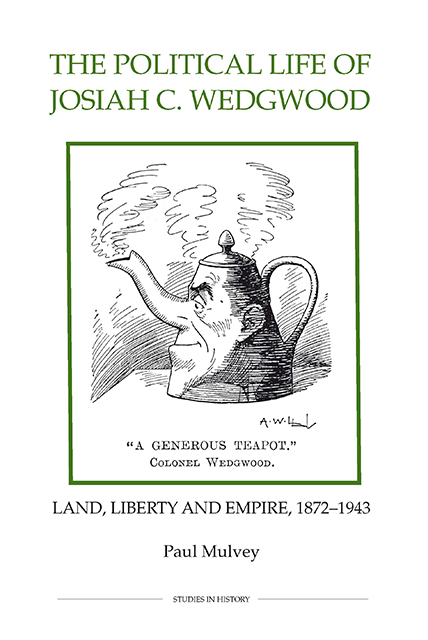12 - Labouring on
Published online by Cambridge University Press: 02 March 2023
Summary
C. V. Wedgwood rightly said of her uncle that ‘in so far as his hopes had been fixed on playing a part in the government of his country, his career was virtually over in 1924’. In terms of active campaigning, however, his career was far from over. Indeed, the ending of any ministerial ambitions left him with the time to campaign for the History of Parliament project and with the freedom to fight more vituperatively than ever in favour of the Jews and against their latest enemy, Nazism. Wedgwood was to fight these campaigns with perhaps even more energy and persistence than he had shown on his earlier crusades. And he certainly succeeded in raising the profile of issues that either – like the History of Parliament – would not have otherwise existed, or – in the case of Jewish refugees – many in government would have preferred to ignore. These battles, however, also showed him at his worst: short-tempered, bureaucratically inept and with a Manichaean view of the world that was simplistic at best and bigoted at worst, and which frequently undermined the essentially sound arguments that he was making.
What was clear to Veronica Wedgwood writing almost thirty years later was not so clear to her uncle in 1924, when for a while at least he still thought that he had a position in the Labour party to fight for. On the 9 October 1924, the very day that MacDonald asked the king for a dissolution, the Labour party conference both resolved to implement the taxation of land values and finally elected Wedgwood to the party's national executive committee. He came third in the ballot behind George Lansbury and Herbert Morrison with 1,464,000 votes. At conference the year before he had come sixteenth with 290,000 votes. Thus, as he lost his Cabinet position he won a place at the centre of the non-parliamentary Labour party. It was not, however, an indication that he had finally gained a following in the constituency parties (other than in his own region) or among the trade unions – it had more to do with a backlash against MacDonald and the inactivity of his government.
- Type
- Chapter
- Information
- The Political Life of Josiah C. WedgwoodLand, Liberty and Empire, 1872-1943, pp. 149 - 163Publisher: Boydell & BrewerPrint publication year: 2010

